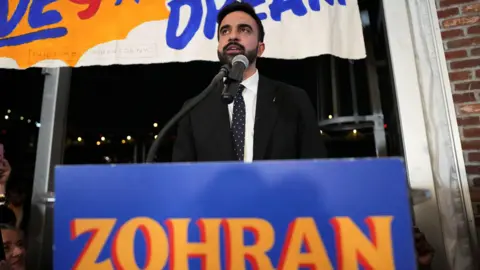How Zohran Mamdani stunned New Yorkers with mayoral primary victory
Zohran Mamdani decided, in his quest to become New York City's mayor, he would walk the entire length of Manhattan - starting at 7 one Friday evening in early June.
By the time he was done, it was 2:30 a.m.
Video of the feat on social media captures New Yorkers frame by frame giving him thumbs up and embracing him. Several clap for the "next Mayor". He's doing it, he tells followers, because New Yorkers deserve a mayor they can see, hear and even yell at.
It takes only a quick scroll through 33-year-old Mamdani's social media accounts to understand just how different his style is from that of a traditional politician, rejecting typical soundbites for a more unrehearsed feel. After he won the New York Democratic primary on Tuesday, that playbook is getting accolades for its ability to attract a large coalition.
This is a wakeup call for the Democratic Party, said pollster Frank Luntz. The big loser of the night wasn't his main opponent, former governor Andrew Cuomo, he said, but the US Senate Minority Leader Chuck Schumer, who represents the Democratic Party establishment.
Grassroots Democrats are demanding "a more ideological, confrontational approach to policy and politics" in the time of President Donald Trump, Mr Luntz said.
Before Tuesday night's win, Cuomo and several Democrats mocked Mamdani's platform - including free public buses and city-run grocery stores - as unrealistic. Millions were spent attacking him. But the millennial, left-wing state assemblyman who represents the diverse neighbourhood of Astoria, Queens, clearly connected with social media-age voters who crave his brand of authenticity and accessibility.
Harris Krizmanich, 30, watched the Manhattan journey video three times. He started following the state lawmaker and democratic socialist in January, when Mamdani was polling at 1%. Krizmanich began canvassing for his campaign.
"I was blown away by his personable skills with the way he talks to people and the way he can relate to just the average person and the way he humanises the voters that felt very frustrated with the way things were going," Mr Krizmanich told the BBC. "It was really inspiring."
 Reuters
ReutersFinding voters where they are
Without Cuomo's name recognition or wealthy donors, Mamdani relied on introducing himself to voters by flooding social media consistently with positive, even humorous, content that showcased his personality and positions.
Polling indicated he piqued the interest and admiration of Gen Z and disaffected voters, who ultimately contributed to his impressive grassroots ground game.
Nearly 50,000 volunteers helped door-knock, and small donors helped him break fundraising records in the race. He also used traditional settings to his advantage: Mamdani's viral clip attacking Cuomo's record and scandals at one of the Democratic debates was viewed over 10 million times on X and over a million more on TikTok.
His identity as an immigrant, unapologetic about his beliefs and faith as a Muslim, was refreshing to those who saw in him their own experiences. The current New York mayor, Eric Adams - far from Mamdani's biggest fan - said earlier in June: "I don't agree with his stance on many things, but I respect the fact he's true to who he is."
After Mamdani's win, however, perhaps sensing a greater threat, Adams - who is running for mayor as an independent in November - called him a "snake oil salesman".
Mamdani is laser focused on cost-of-living issues. He said his conversations with voters often came down to common-sense discussions about leading a dignified life and how city government can help ensure that.
But the results also show Mamdani's appeal across the wealth divide - he polled worst among lower-income residents, at 38% to Cuomo's 49%.
At a recent event, Mamdani told the BBC that "there's a lot of understandable despair and disappointment with so-called leaders within our own party who have shown themselves unable or unwilling to fight Donald Trump". He included Andrew Cuomo and Eric Adams on that list.
"We need a mayor who can look authoritarianism in the eye and not see a reflection of themselves."
A lesson for struggling Democrats?
In the wake of Trump's victory, many left-wing Democrats have argued that the lesson of November's defeat is not that Americans have moved further right, but that they want a new approach to politics.
Stephanie Taylor, of Progressive Change Campaign Committee, told the BBC that she hopes this is finally a wake-up call that the Democratic base is absolutely fed up.
"We've seen a Democratic Party establishment that has actively worked to undermine and defeat some of our best and brightest and most charismatic for ideological reasons. Because they didn't like their anti-corporate stances or anti-war stances or their anti-corruptions stances," she said.
"Voters want to believe that you're going to fight for them."
Mamdani still has to win in the general election in November, and if he prevails, the pressure will be on to prove he can actually deliver on his big promises despite limited experience in government.
